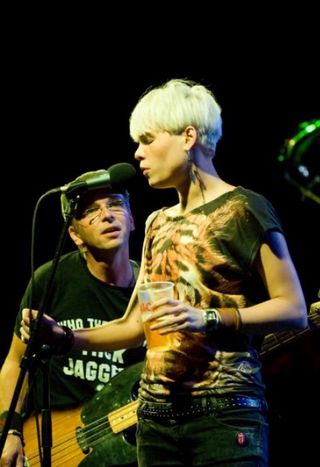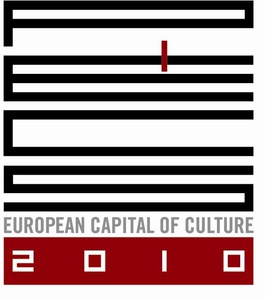
Pécs: can you be a 'culture capital' if that status scares off your artists?
Published on
Translation by:
Helen CrumptonThe Hungarian city of Pécs may be this year’s European capital of culture alongside the German and Turkish cities of Essen and Istanbul, but its performers prefer to seek their salvation further afield
 Until the end of 2010 Pécs can embellish its name with the title of 'European capital of culture'. Four-star hotels, a music and conference centre and a new cultural quarter are duly being built to do justice to the award. Yet it is too much in one go according to the critics. When the capital of culture year is over, only a fraction of the projects will be completed. Afterwards Pécs will once again be what it was before: a Hungarian provincial town in the shadow of the overpowering Budapest.
Until the end of 2010 Pécs can embellish its name with the title of 'European capital of culture'. Four-star hotels, a music and conference centre and a new cultural quarter are duly being built to do justice to the award. Yet it is too much in one go according to the critics. When the capital of culture year is over, only a fraction of the projects will be completed. Afterwards Pécs will once again be what it was before: a Hungarian provincial town in the shadow of the overpowering Budapest.
Pécs: capital losses
The budget for the European capital of culture year was 34 billion forints, which is about 107 million pounds. As part of the city’s renovation, a third of this was channelled into the historical Zsolnay Porcelain factory site. A new cultural quarter should be developed on the 36, 000 square metre site. The 150 year old tradition of the Zsolnay factory almost completely came to a standstill during socialism; the site deteriorated noticeably. 'Primarily, the capital of culture year has provided the possibility to meet the requirements,' notes Gábor Sztanics, the architect for the cultural project.Vision Zsolnay
With a population of 160, 000, Pécs is the fifth largest city in Hungary. It is the birth place of Victor Vasarely, the cofounder of the Op Art (Optical art) artistic movement as well as the late Pécs-born Bauhaus architect Marcel Breuer. The local music scene has earned Pécs the name the 'Liverpool of Hungary'. Meanwhile, the 'borderless city' is the motto for the city as the capital of culture in 2010. Only it doesn’t help to keep anyone in the city, and if you want to make a name for yourself, it won’t be in Pécs.
Songwriter Eszter Takáts explains that she seemed to get one year younger after she left Pécs for Budapest. Financial difficulties, regular moves and a lack of performance opportunities had severely choked the singer’s psyche. The borderless city had become a prison, and the change of air brought success; today Eszter performs all over eastern and central Europe. Inevitably, the question as to whether Pécs drives out artists emerges. 'The notion is not unrealistic. It allows the big headed idea to prevail that everything happens in Budapest,' comments Zoltán Csernák from Pécs’ jazz band Singas Project. Hungarian prime minister Viktor Orbán’s cultural policy is trying to establish a trend reversal. Marcell Jankovics, a former president of the national arts fund of Hungary, spoke of a 'cultural pyramid', meaning that the minorities should receive more financial support. That refers to amateurs, provincial Hungarians and Hungarians living abroad.
Not only Pécs
In Pécs there's optimism despite the plans. Over the last hundred years it has all been about going to Budapest to be spotted. Peter Hűvösvölgyi, guitarist of the band Neofolk, says he would be glad if this were to change. He had represented Pécs in the German town of Essen alongside Istanbul, which are the second and third capitals of culture 2010. He says an amateurism which embodies Pécs caught his eye.
'No value is attached to standard and quality here, it's all rather cliché. The people who are responsible do not support anything at all, but are just glad when everything is over.' the musician rants. Neofolk’s music feeds off the roots of the Roma minority, Slavs and Jews. 'Music is used to convey cultural diversity,' says Hűvösvölgyi. However even the band knows that ethno-jazz and world music isn’t for everyone. 'If you do anything along these lines you must definitely base yourself in Budapest; there are very few performance opportunities in Pécs itself.'
'We make culture, but it isn’t always culture as defined by politics'
One person who doesn’t want to leave Pécs is Viktor Molnár. Armed with a big red bushy beard, he walks through a former school building on the edge of the city called Z.I.O.N.. It is going to become a youth and music cultural centre. What should take shape here is a kind of alternative counter project to the good old Zsolnay cultural quarter, but this project doesn’t appear in the capital of culture budget this year. 'We make culture, but it isn’t always culture as defined by politics,' says Molnár.
The Rockmarathon has taken place near Pécs for the last decade. It's a week long music festival with over 40, 000 visitors in 2010. According to the event organisers its success was partly thanks to the advertising it received through the capital of culture year. 'Pécs is a good platform for this type of music, even though nobody here is interested in it,' says Zoltán Varga, organiser of the Rockmarathon. He doesn’t want to portray the local bands’ situation too dramatically because many were also at the festival. 'In Budapest life is easier than in the provinces. But you shouldn’t give up too quickly, rather give to the people, wherever they are curious.' And curiosity is famously borderless.
Images: main Singas project © facebook.com/SingasOfficial; graffiti (cc)casso.catena/ Flickr; video Zion TV ©zionpecs.blog.hu/; Neofolk (cc) Youtube
Translated from Europas Kulturhauptstadt Pécs - Grenzenlose Eingrenzung



